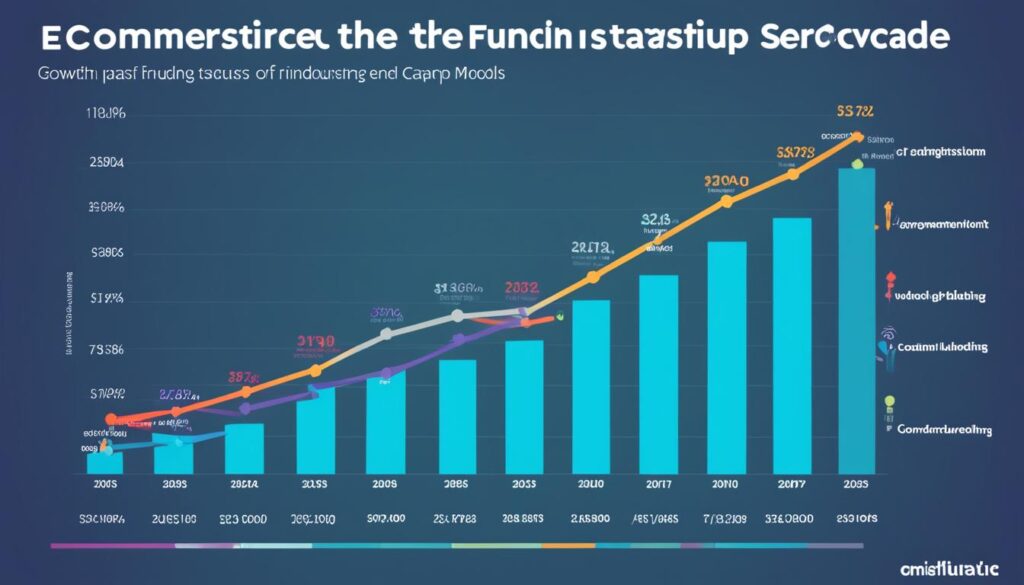Hyderabad , India
We’re on the edge of a new wave of innovation, and it’s thrilling to think about the future of startups in India. Over the last decade, we’ve seen a huge change. Dreams have turned into real businesses thanks to passion and creativity. This change is full of stories of resilience, breakthroughs, and a drive to make a better future.
In places like Bengaluru and Delhi, India is home to an amazing 50,000 startups. This makes us the third-biggest startup scene in the world. The growth we see is more than just numbers. It’s about entrepreneurs who are changing our economy with new tech like AI, blockchain, and health tech. In this article, we’ll look at key trends that are changing business and what challenges and opportunities they bring. Let’s explore what the future holds for our startup world together.
Key Takeaways
- India is the third-largest startup ecosystem globally, with over 50,000 startups.
- Collaborations among startups, established companies, and government organizations are essential for growth.
- Emerging technologies like blockchain and IoT are gaining traction across various sectors.
- The focus on sustainability and environmental responsibility is increasing among startups.
- Significant growth is forecasted in fintech, health tech, and edtech sectors.
- Venture capital and angel investors are actively supporting promising startup ventures.
- The culture of entrepreneurship in India is evolving, boosting economic development.
Introduction to India’s Startup Ecosystem
The Indian startup scene has grown fast, becoming the third-largest in the world. It now has over 112,718 startups across various sectors like fintech, e-commerce, health tech, and edtech. This growth is thanks to a young, energetic population and a growing middle class eager for new ideas.
Between 2016 and 2022, the number of startups jumped by 15,400%. This shows a huge growth rate. The 15% annual increase from 2018 to 2020 made a great place for new entrepreneurs. Programs like Startup India help by making it easier for new ideas to grow and succeed.
Foreign investors have also played a big part in our startup scene. About 80% of the venture capital in Indian startups comes from abroad. In 2020, these startups brought in $11.3 billion, showing how trusted and supported they are globally. This support helps with money, advice, and networking, making India a key player worldwide.
Looking into this exciting ecosystem further, we see how tech and new business ideas are opening up new paths to success. India is set to create many jobs, boost its economy, and keep encouraging entrepreneurship.
Current Landscape of Startups in India
The startup scene in India is buzzing with new ideas and chances. Over 112,718 startups are recognized by DPIIT, showing a wide range of sectors. About 13% focus on IT services, 9% on healthcare, and 7% on education. Agriculture and food & beverages each have 5%, showing a mix of old and new challenges.
Am Accountable offers virtual accounting services for Indian startups. We help businesses set up virtual accounting teams in just 24 hours. This boosts efficiency and cuts costs. The funding for startups has grown a lot, showing a 15X increase from 2015 to 2022. This growth has brought more active investors, showing the potential in new industries.
Bengaluru is the top spot for unicorn startups in India. Delhi (NCR) and Mumbai are also key places. By October 3rd, 2023, India had 111 unicorns worth $349.67 billion. This is a 66% jump in creating unicorns since FY 2017-18. Climate-tech and deep-tech are also seeing a lot of investment, showing the future of startups.
Social commerce is another big thing in startups. Meesho, a big success, is now a unicorn worth $2.1 billion. It shows how local entrepreneurship can grow big. Even with less investment in 2023, tech startups are still strong, focusing on making money and growing sustainably.
Startups are not just about making money; they also change lives. Our startup world is changing fast, showing that innovation is key to India’s growth.
| Sector | Percentage of Startups |
|---|---|
| IT Services | 13% |
| Healthcare | 9% |
| Education | 7% |
| Agriculture | 5% |
| Food & Beverages | 5% |
Technology and Innovation Driving Growth
Technology trends are changing the way businesses work in India’s startup scene. With the help of Artificial Intelligence (AI), Machine Learning (ML), and the Internet of Things (IoT), we see new ways of doing things. These technologies improve how we connect with customers and create new business models that fit today’s market.

India has seen a big rise in tech startups, with more new companies and funding. In just 10 months, some startups have reached 100k monthly visitors. This shows how big an impact they’re making. These startups use technology to solve real problems, focusing on what customers need.
- Emerging technologies such as blockchain, augmented reality, and 5G networks are becoming mainstream.
- The gig economy is expanding, leading individuals toward freelance and gig work.
- Investment and funding are essential, driving innovation across various sectors.
The Indian startup community works together to drive innovation. Startups work with accelerators, incubators, and venture capitalists to get the help they need. This helps them grow and succeed. We see tech startups changing old industries like retail, transportation, and finance, keeping innovation at the heart of business in India.
Success stories like Airbnb and SpaceX show how innovation can change big sectors, inspiring new entrepreneurs.
Tech startups use agile methods to quickly respond to market changes, test ideas, and change direction if needed. This quick adaptability is key in a world where technology is always changing. The future looks bright for startups that use these innovations to change the business world.
Government Initiatives Supporting Startups
The Indian government is key in helping startups grow with various programs. The Startup India Seed Fund Scheme is one such effort. It plans to give INR 945 crore to support 3,600 entrepreneurs over four years. This helps new businesses get the funding they need to start strong.
Another program, the Credit Guarantee Scheme for Startups, has already helped 46 startups with guarantees worth INR 132.13 crore. It focuses on women-led startups, giving INR 11.3 crore to seven startups that employ 6,073 people. These programs support startups in many fields, like consumer services and IT.
The Startup India Investor Connect platform helps startups find investors. It aims to help startups in all cities, not just big ones. This platform brings together investors and entrepreneurs from different backgrounds, making the startup world better connected.
These government efforts are building a strong base for startups in India. The goal is to have startups and MSMEs make up 50% of the GDP by 2024. With programs like the SIDBI Fund of Funds Scheme, the government is putting INR 17,452 crores into 939 startups. This shows a big commitment to supporting entrepreneurship.
The SAMRIDH Scheme offers up to ₹40 lakh to about 300 tech startups. The Drone Shakti initiative aims to bring in over ₹5,000 crore in drone manufacturing in the coming years.
| Initiative | Outlay (INR) | Target Beneficiaries | Focus Area |
|---|---|---|---|
| Startup India Seed Fund Scheme | 945 Crore | 3,600 Entrepreneurs | Incubation |
| Credit Guarantee Scheme for Startups | 132.13 Crore | 46 Startups | Women-led Startups |
| SIDBI Fund of Funds Scheme | 10,229 Crore | 939 Startups | Financial Support |
| SAMRIDH Scheme | Up to 40 Lakh per Startup | 300 Tech Startups | Tech Innovation |
| Drone Shakti Initiative | 5,000 Crore (Expected) | Drone Manufacturers | Manufacturing |
Changing Consumer Behaviors and Market Trends
In India’s fast-changing startup scene, knowing consumer behavior is key. Recent changes show big shifts that startups must tackle to stay ahead. Now, people want personal experiences and specific recommendations. This is a chance for startups to innovate and build strong bonds with customers.
There’s also a big push for sustainability and social responsibility. People now think about the environment and social issues when picking brands. So, startups are focusing on ethical sourcing and sustainable practices. This is crucial in a market shaped by these market trends.
The COVID-19 pandemic made online shopping more popular, pushing people to e-commerce. Our startups can take advantage of this shift, especially with voice commerce on the rise. Voice assistants like Amazon’s Alexa are making shopping easier than ever.
Health and wellness are now top priorities for consumers. Startups that focus on these areas can gain loyal customers. The rise of Buy Now, Pay Later (BNPL) shows how consumers want flexible payment options. This trend is growing fast.
This table shows key consumer trends and how startups can respond:
| Consumer Trend | Startup Response |
|---|---|
| Increased Personalization | Tailored recommendations and experiences |
| Sustainability Focus | Investment in ethical sourcing and sustainable practices |
| Digitization of Shopping | Enhanced e-commerce capabilities |
| Health & Wellness Demand | Development of wellness-focused products |
| Rise of BNPL | Flexible payment options in offerings |
In summary, today’s market trends call for startups to be adaptable and responsive. By focusing on these changes, we can meet our customers’ needs and succeed. At Am Accountable, we offer virtual accounting services for startups in India. Our innovative approach lets you build a virtual accounting team in just 24 hours. Save time, cut costs, and boost efficiency with our expert services. Contact us at +91 91778 42756.
Future of Startups: Emerging Technologies and Business Models
Looking ahead, emerging technologies are changing the startup world. Startups in India are using AI and blockchain to make new business models. These techs make things run smoother and give customers what they want, setting new standards in the market.
Artificial Intelligence and Machine Learning
AI and machine learning are changing how startups work. Founders use these techs to automate tasks and make smart choices. For example, AIContentfy hit 100k monthly visitors in just ten months, showing AI’s big impact on growth. Startups in e-commerce and healthcare use predictive analytics and personalized tips to make customers happier and run better.
Blockchain and Cryptocurrency Trends
Blockchain is opening new doors for startups, especially in secure, open transactions. Things like smart contracts and supply chain management show blockchain’s growing role. By using these techs, startups can be more secure, gain user trust, and work better. The rise of cryptocurrency is also pushing entrepreneurs to try new ways to fund their businesses.
| Technology | Impact on Startups | Example Application |
|---|---|---|
| AI & ML | Enhances decision-making and automation | Personalized shopping experiences in e-commerce |
| Blockchain | Increases security and transparency | Smart contracts in real estate |
| IoT | Enables interconnected products | Smart home devices |
| 5G Technology | Improves real-time data processing | Telemedicine services |
| Sustainable Tech | Addresses ecological challenges | Green energy solutions for startups |
Sustainability and Social Impact in Startups
Startups in India are now focusing on sustainability and social impact. They’re moving away from just making money. They aim to be responsible and tackle big issues like climate change and resource use.
The triple bottom line approach is key. It looks at profit, people, and the planet together. This means startups work on being good for society and the environment while making money.
Many startups are tackling big problems like clean water, healthcare, and education. They focus on social entrepreneurship to make a difference.
To be sustainable, startups need a clear mission and values. They must work with customers, employees, suppliers, and communities. This builds trust and loyalty with customers who care about ethics.
Sharing how they’re doing on social and environmental issues helps startups look credible. They use reports and stories to show their commitment to sustainability and making a difference. Investors are now looking for these green tech startups.
Companies like Tesla and Beyond Meat are changing the game. They’re not just making a mark in their industries. They’re pushing for a shift towards responsible consumption.
But, there are still hurdles like getting funding, dealing with rules, and getting people to use their products. Yet, we think sustainable startups will keep growing. They’ll bring big changes that meet society’s needs and protect the environment.
Sustainability and social impact are key for startups today. They show the need for businesses to be responsible. As we move forward, companies that focus on these values will lead us to a better future.
Learn more about our efforts in sustainability and how we address challenges on our about page.
Talent Development and Skills Enhancement
In today’s competitive startup world in India, talent development is key for long-term success. Startups need to improve skills to stand out. Focusing on entrepreneurial skills helps attract and keep top talent, boosting innovation.
Employee development programs are crucial for staying ahead. They include training, online learning, mentoring, and industry events. These help fill skill gaps and improve job skills, keeping teams engaged. We also use performance assessments to help employees reach their full potential.
Good workforce planning helps us know what skills we need. Clear performance goals are important for our talent strategies to match our business goals. We use tools like TalentEase™ to track progress and improve performance reviews, boosting motivation and satisfaction.
Investing in learning programs pays off big time. Companies with these programs see 218% more income per employee. Rewarding top performers boosts motivation and dedication. Offering career paths helps employees and aligns with our goals.
As we move forward, we must keep improving our talent management efforts. This helps grow the next generation of entrepreneurs in India. By supporting personal growth, we help our team and the startup world succeed.
Funding Trends and Investment Opportunities
Funding is key to helping startups grow in India. In recent times, venture capital investments have gone up a lot. This is especially true for sectors that use new technologies like AI.
AI startups have seen a big increase in VC funding over the past three years. This includes a lot of money coming in late 2023 and early 2024.
There are many investment chances in generative AI, which is getting a lot of attention. For example, searches for “Anthropic” have jumped over 2,850% since 2019. This shows investors are getting more interested.
Startups working on AI for agriculture are also getting noticed. Searches for “agriculture AI” have gone up more than 658% in five years.

Now, there are more ways for startups to get funding. Crowdfunding is one option that lets entrepreneurs keep control of their company. This has led to more ways to get money without giving up shares, like grants and partnerships.
VC investment is becoming more global, offering Indian startups chances to grow worldwide. It’s important for startups to connect with investors at the right time. Experts like Susie Meier say it’s key to match what investors want. They also look for startups that tackle market challenges and use sustainable practices.
Looking ahead to 2024, the startup world will keep changing with these funding trends. There’s a move towards ethical tech investments and sustainable innovations. Startups that can adapt to these trends have a good chance of doing well in the competitive Indian market.
Conclusion
The future of startups in India looks bright, thanks to new solutions. These solutions are changing the entrepreneurial scene. Companies like Tesla show us how important it is to focus on being sustainable.
Startups are key in this change. They are quick and bring new ideas. For example, Meru Health is making a big impact in mental health. This shows there are many areas where startups can make a difference.
Now, we see more interest in areas like education and fighting climate change. These areas combine business success with helping society. With 49% of startups coming from smaller cities, we see a lot of new opportunities.
Looking forward, we need to use new technologies and support startups. By using new solutions and understanding what people want, Indian startups can do well. By facing challenges and taking chances, we will change the future of startups in India.
FAQ
What is the current state of the startup ecosystem in India?
India’s startup scene is booming, with over 92,683 startups and 108 unicorns. This growth comes from a growing middle class, more digital use, and young entrepreneurs.
How are emerging technologies influencing Indian startups?
Technologies like AI, ML, and IoT are changing how businesses work and connect with customers. Startups using these techs are making new solutions and models. This makes them more competitive at home and abroad.
What role does the government play in supporting startups in India?
The government backs entrepreneurship with programs like Startup India. It makes starting a business easier and helps with funding and support. This helps startups grow and innovate.
How are consumer behaviors changing in response to the evolving market?
Thanks to tech and internet growth, what people want is changing fast. Startups are responding by offering tailored services and digital payments. They’re quick to adapt to new trends like online shopping and touchless payments.
What are the major funding trends impacting Indian startups?
There’s a big increase in venture capital investments, with angel investors key to startup support. Crowdfunding is also becoming more popular, giving startups more ways to grow.
Why is sustainability becoming a focus in the Indian startup landscape?
Indian startups are focusing on being sustainable, making their businesses more eco-friendly. This is because more people want to support companies that care for the planet. Startups are finding ways to make money and help the environment.
How important is talent development for the growth of startups in India?
Finding and training talent is crucial for startups to grow. There’s a big need for programs that fill the skill gap. Working together between schools and startups is key to helping the next generation of entrepreneurs.








